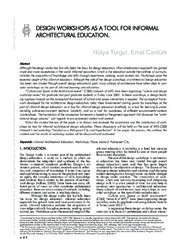Design workshops as a tool for informal architectural education
| dc.contributor.author | Turgut, Hülya | |
| dc.contributor.author | Cantürk, E. | |
| dc.date.accessioned | 2016-02-04T08:18:12Z | |
| dc.date.available | 2016-02-04T08:18:12Z | |
| dc.date.issued | 2015 | |
| dc.identifier.issn | 0168-2601 | |
| dc.identifier.uri | http://hdl.handle.net/10679/1364 | |
| dc.identifier.uri | http://www.openhouse-int.com/abdisplay.php?xvolno=40_2_11 | |
| dc.description | Due to copyright restrictions, the access to the full text of this article is only available via subscription. | |
| dc.description.abstract | Although the design studio has formally been the locus for design education, informal education approach has gained more and more acceptance in the world. Informal education, which is the education outside the confines of curricula, includes the acquisition of knowledge and skills through experience, reading, social contact, etc. Workshops cover the essential weight of this informal education. Although the role of the design workshops in architectural design education has been very limited through overall design education’s past, many schools of architecture have taken steps to consider workshops as the part of informal learning and education. “Culture and Space in the Build environment” (CSBE) Network of IAPS have been organizing “culture and design workshop series” for graduate and post graduate students in Turkey since 2001. In these workshops, a design teaching approach based on the conceptual framework of culture and space interactions is applied. The conceptual framework developed for the architectural design education, takes three fundamental starting points for workshops as the part of informal design education: as a tool for informal design education (method), as a tool for learning & understanding culture-environment relations (content), and as a tool for awareness of different environments/contexts (scale/place). The foundation of the conceptual framework is based on the general approach that discusses the “architectural design process” with regards to environmental context and content. Within this context the aim of the paper is to discuss and evaluate the importance and the contribution of workshops as tool for informal architectural design education. These discussions will be held on the case of IAPS-CBSE Network’s last workshop “Istanbul as a Palimpsest City and Imperfection”. In the paper, the process, the method, the content and the results of workshop studies will be discussed and evaluated. | en_US |
| dc.language.iso | eng | en_US |
| dc.publisher | Open House International Association | en_US |
| dc.relation.ispartof | Open House International | en_US |
| dc.rights | openAccess | |
| dc.title | Design workshops as a tool for informal architectural education | en_US |
| dc.type | Article | en_US |
| dc.description.version | publisher version | |
| dc.peerreviewed | yes | en_US |
| dc.publicationstatus | published | en_US |
| dc.contributor.authorID | (ORCID 0000-0001-8105-7794 & YÖK ID 60288) Turgut, Hülya | |
| dc.identifier.volume | 40 | |
| dc.identifier.issue | 2 | |
| dc.identifier.startpage | 88 | |
| dc.identifier.endpage | 95 | |
| dc.identifier.wos | WOS:000363092200012 | |
| dc.subject.keywords | Informal architectural education | en_US |
| dc.subject.keywords | Workshops | en_US |
| dc.subject.keywords | Place | en_US |
| dc.subject.keywords | Istanbul | en_US |
| dc.subject.keywords | Palimpsest city | en_US |
Files in this item
This item appears in the following Collection(s)
Share this page



